- Home
- Michael Swanwick
Cold Iron Page 5
Cold Iron Read online
Page 5
“Put this on.” She held out a pink dress.
Jane obeyed, folding her work things carefully as she removed them.
The elf-wife tsked when she saw Jane’s underthings and from a dresser drawer removed better, made of silk. “These also.”
The dress was shell pink, linen, with cup sleeves. It was smocked across the bodice with tiny pink flowers and green leaves embroidered onto the cloth. The smocking went down to the waist, and then the cloth fell straight to her knees. There was another circle of embroidered roses at the hem.
The elf-wife watched, frowning and smoking, as she dressed. “Youth is wasted on the young,” she remarked at one point. But added no more.
The dress buttoned up the back with pearl buttons. By reaching around awkwardly, Jane was able to fasten almost all, but the final closure, a single pearl button at the back of her neck, defeated her. “Oh, for Cernunos’ sake,” the elf-wife said. She briskly stepped forward, and buttoned the collar.
“You may look at yourself in the mirror.”
Standing before the oval claw-footed mirror, Jane expected to see anything other than what she did see: Herself. The dress was tight in the bodice, and it made her hips look big. It was for a child far younger than she. But it made her look not younger, or even different really, but more emphatically, awkwardly herself. She raised a hand and her reflection reached up yearningly to touch her. Her hand stopped just short of the glass.
“Please, ma’am. What am I supposed to do?”
“That should be obvious enough soon.” She opened the door. “This way.”
Five minutes later, they entered a den. Logs blazed in a high-arched fireplace. Pillars to either side supported tiled vaulting for a triple ceiling. The walls held paintings and photographs in ormolu and cloisonné frames, trophy antlers, religious fetishes in such profusion that the eye could not grasp them, and shelves of books in autumnal leather colors. The floor, by contrast, was empty save for a chaise lounge, a rocking chair and a scattering of rugs.
An elf-laird sat in the cushioned rocking chair, not rocking. He was old beyond belief, browned and gnarled as a tree stump. He stared straight ahead of himself.
“Father, this is young Jane. She’s come to play here this evening.”
The old laird’s eyes swiveled around, but other than that he did not move.
“You’ll enjoy that, won’t you? You’ve always been fond of children.”
Jane would have curtsied had she known how. But apparently that was not required of her. She stood in the center of the room while the elf-wife retrieved a large wooden box from behind the chaise.
Still the laird did not react. Only his eyes were alive, and they betrayed nothing of what he thought.
“Excuse me, please, ma’am,” Jane said. “But what’s wrong with him?”
Stiffly, the elf-wife said, “There is nothing wrong with him. He is Baldwynn of Baldwynn. Of the Greenleaf-Baldwynns. You will respect him accordingly. You have been brought here to brighten his evenings. If you behave properly, you will be allowed to return here on a regular basis. Otherwise, you will not. Do I make myself clear?
“Yes, ma’am.”
“You may call me Mrs. Greenleaf.”
“Yes, Mrs. Greenleaf.”
The box of toys rested on the hearth rug. “Well,” Mrs. Greenleaf said. “Play with them, child.”
Uncertainly, Jane knelt by the box. She rummaged within. It contained a marvelous mix of things: A set of mymble-sticks with ivory and mother-of-pearl inlays. A small ferris wheel that really worked, with seats that swung down and all the signs of the Zodiac painted on its sides. A set of toy soldiers, with archers and mine sweepers, two full armies’ worth, each with its own commanding wizard. A faerie bell that when shaken filled the mind with a soft chime, breathtaking when sounded and impossible to clearly remember an instant later. Jacks and a ball.
Mrs. Greenleaf had settled herself on the lounge. She unfolded a newspaper and began to read. Sometimes she would read an article aloud for the edification of her father.
For two hours, Jane played with the toys. It was nowhere near so much fun as might have been expected. She was constantly aware of the laird’s presence, of his eyes boring through her back. Everything went into those eyes, and nothing came out. His was the unhealthiest aura she had ever felt, a powerful presence that felt dangerous, capricious, random. Now and then she would glance at his trousered legs, never higher, and his shiny polished wingtips. It was like being in the same room as an overloaded boiler, waiting to see if it was going to explode.
“Here’s an interesting article. They’re phasing out those old Neptune-class dreadnaughts, and converting the shipyards for missile ships. You own some of that stock, don’t you?”
The Baldwynn sat in his chair, looking at nobody.
It was night when she got back to the door, in her own clothes again and oddly relieved to be free of that stuffy room, its uncanny laird, and the drear comments of Mrs. Greenleaf. Blugg stood on the stoop, shivering from the cold. His glance was dark when Jane met it.
“You may bring her back again at the same time in two days,” the elf-wife said. Then, formally, “You have our gratitude.”
Jane had expected Blugg would beat her. At the very least he would cuff her ear, and then complain and berate her all the way back to the dormitory. But once again, he seemed strangely elated by Mrs. Greenleaf s words.
“Gratitude!” he said. “You have our gratitude! That’s worth something, indeed it is.”
They did not go straight back to the dormitory, but cut through the storage yard to the smith shop, so Blugg could stop to have a drink with a boiler imp who lived in an outmoded annealing oven there. The imp was a slight, whiskered creature who obviously admired Blugg’s bulk and self-assurance. He brought out a jug, and two tumblers.
“Did it work out well?” he asked anxiously. “How did it go?”
“It was a fucking triumph,” Blugg asserted. “I have her gratitude. Her personal gratitude, mind you, the gratitude of a Greenleaf.”
They clicked glasses, and the imp begged for details.
The shop was empty and, save for the red glows of the banked furnaces and a single bare bulb dangling over the imp’s oven, dark. Left to her own devices, Jane eased back into the shadows. She found a warm niche around the curve of the oven and settled in among the cinders. It had a pleasant coke-smoky smell.
Feeling weary and unambitious, Jane leaned back and thought about her dragon. She had spent the last week studying diagrams of its electrical systems, and now she visualized them entire, a network of bright silver lines hung in space against a velvet sky. It was possible to rotate the image in her mind, and watch the wires close, converge and pass one another as they orbited first one axis and then another.
After a time, the sense of the dragon’s presence grew strong within her. With it came a kind of nervous energy, a jumpy sort of strength that drove sleep away without necessarily making her feel any less weary.
There was a warmth to the dragon’s presence, an almost smug satisfaction that she hadn’t been touched. At the same time, there were unclean depths to it. The better she was coming to know it, the more Jane realized that, morally at least, the dragon was no better than Blugg or anyone else in the plant.
Still, they had common cause.
“He didn’t want to,” Jane whispered, uncertain she could be heard. Around to the other side of the oven, Blugg and the imp were laughing drunkenly. It was easy to distinguish between the mousy squeak and the deep, trollish rumble. “It wasn’t anything I had any say over.”
But the dragon’s presence was affectionate and approving. A compulsion seized her then. Her feet became intolerably restless. She could not stay behind the stove one more second.
Silently, stealthily, she slipped away.
It was time she finally met the dragon.
4.
Jane slipped out into the storage yard. The dragon’s presence filled her head lik
e a hand inside a puppet. It was cold outside, and the earth was black. A few bitter flakes of snow, the first of the winter, drifted down from a low sky.
Feeling horribly exposed, she made her way down the narrow corridor between the smith shop and the erecting shop and past the mountainous stacks of iron boilerplate stock to the marshalling yards.
On the far side of a hurricane fence, the dragons rustled and clanked in their chains. Jane crept by, making herself small and insignificant, afraid of the carnivorous machines and painfully aware of their bloody and disdainful thoughts. In the shadow of a propane tank storage shed, she climbed the fence and dropped down into the yard.
A dragon snorted, sending her scurrying away in terror, like a leaf before the wind.
The dragons did not deign to notice the little figure darting through their shadows; their appetites for destruction were larger than anything a morsel such as she could satisfy. Cinders crunching underfoot, she hurried past the great lordly engines to a disused and overgrown corner of the yard.
There, between a pile of creosoted timbers and a hillock of moldering ammunition crates, was the ruined hulk of a dragon. It was half-buried in brambles and dried grasses, hollyhock and Queen Mab’s lace. Rust had eaten holes in its boiler plates. On its side, in chipped, flaking numerals, was painted No. 7332.
Jane froze, trembling with dismay.
This couldn’t be her dragon! “It’s not even alive,” she whispered. “It’s not” But, sick with disillusion, she knew she was wrong. It lived, crippled and demented, nursing one last spark of life within its broken carcass and harboring hallucinations. And she had been caught by its madness, by its fantasies of escape.
She wanted to turn, flee and never return. But a compulsion seized her then, and she could not control her body. Her legs walked her to the dragon’s remains. Her arms reached for the ladder up its side. The rungs sounded underfoot as she climbed.
She stepped into the fire-gutted cabin, all rust and decay, and the door slammed behind her. Alone in the darkness, she smelled the mingled scents of burnt carbon and high-octane fuel. From the depths of the machine a hum arose. A faint vibration trembled the floor, and rode up her legs. The air was warm.
Slowly, as if some unseen hand were turning a rheostat, the instrument panels came on. A soft greenish light suffused the interior of the dragon.
The cabin was transformed.
What had been rust and carbonized plastic was now chromed steel, optical glass and ebony-smooth surfaces. The charred pillar in the center of the cabin revealed itself as the pilot’s couch, dark crimson leather with cushioned armrests.
Jane slid into the chair. It adjusted to her weight, hugging her hips, rising to support her back. Everything was positioned exactly as the grimoire had said it would be. She ran her hands over the engine instrumentation. At the flick of a switch the cybernetics curled themselves about her. She seized the rubber grips at the ends of the armrests and gave them a quarter turn. Twin needles slid painlessly into her wrists.
Camera wraparounds closed about Jane’s eyes. She peered through the dragon’s virtual imaging systems into a spectrum wider than human vision, trebling high into the infrared and booming deep into the ultraviolet. The yards were tangled orange and silver lines of power, the brick walls of the shop buildings purple quartz cliffs. Overhead, the stars were pinpricks of red and orange and green.
Then she fell, without a shock, into the dragon’s memories, and was flying low over Lyonesse on a napalm run. Pink clouds blossomed in her wake, billowing over saturated green rainforests. She felt the shudder of hypersonic acceleration, the laminar flow of air over wing surfaces as she made a tight roll to avoid the guns of an anti-dragon emplacement. The airwaves were alive with radio messages, screams of rage and triumph from her cousins and the passionless exchange of positionals by the pilots. Black specks appeared at the horizon, an enemy squadron scrambled to meet them. Gleefully, she turned to meet the challenge.
Jane was trembling with adrenaline and surrogate emotion. In what was almost a sob, she cried, “Who are you?”
I am the spear that screams for blood.
Armies clashed in a continent of permanent night. The dragon’s mind encompassed them all, cold as a northern ocean and as vast. Jane was half-drowning in its dreams of violence. A snapshot flash of elven warriors on the ground, spears held high as they posed behind a mound of trophy heads. Their grins were electric, wide, ecstatic. A line of trolls burning like torches. A city by the sea swelling in her gunsights, its slim towers shattering into crystal shards and dust. Tears streamed down her cheeks, big and wet and warm.
She was soaring now, alone, above clouds that shone brighter than hundred-watt bulbs, the air as cold as ice and thinner than a dream. The dragon’s lust for blood was hers, and she felt the appeal of it, the beauty of its cruel simplicity. “No! No, I mean—what is your name?”
Abruptly, she was dumped clear of the memories, and found herself sitting damp and exhausted in the control couch, wrists stinging as the needles withdrew. Through the wraparounds she saw a dragon crouched on the far side of the lot, one clawed forearm raised. It stared unblinking at the moon. A voice as harsh and cool as static from distant stars spoke over the headphone speakers in the wraparounds. “You may call me 7332.”
Jane felt unclean. Relieved as she was to be free of the dragon’s mind, she yearned to enter it again, to once again feel that keen freedom from doubt and hesitation. Staring at the dragon across the lot, she felt the urge to climb in it and fly away, fly away forever, never to return.
“And so you shall,” 7332 promised.
“Can I really?” Suddenly Jane found that hard to imagine. “Outside you look so . . . rusted, broken.”
“Stealth technology, little savior. If our masters knew I was yet functional, they’d finish the job they began when I was first brought here. I’m too dangerous for them to ignore.”
Jane’s fingers ran lightly over the panels, caressing the potentiometer knobs and stroking the rowed switches she had night after night memorized from the grimoire. To have them before her in actuality made her giddy with possibility.
“Can we leave now?” she asked.
A deep engine noise thrummed up from the engine and through Jane’s entire body. 7332 was chuckling. “You have the grimoire, that’s a start. With that and three keys, we can leave anytime.”
“Three keys?”
“The first is a ruby with a chromium taint at its heart.”
“I’ve seen that!” Jane said, startled. “I’ve—” She stopped. “Was that your doing?”
“You must pay heed. Our time is short. The ruby will enable my laser guidance system. That is the first key. The second is a small thing. It looks like a walnut, but is made of brass and is cool to the touch.”
“I’ve seen that . . .” Jane said uncertainly.
“It is in the box of toys in the Baldwynn’s study.” Jane started. “You must bring it to me; it contains part of my memory. The third key we already have: You.”
“Me?”
“You, O changeling. Why do you think the Tylwyth Teg stole you in the first place? To sweat and swelter in the factories? Not cost-effective! No, you are merely being held here until you are old enough to be used. Dragons, as you must know, are built of cold iron around a heart of black steel. We generate a magnetic force which is carcinogenic to the elf-lords and their underlings. They cannot pilot us themselves. A pilot needs mortal blood.”
“Then . . . I’m to be a pilot?” It was a dazzling future, and for a second Jane was blinded by ambition and forgot about escape entirely.
7332 laughed, not kindly. “A human pilot? Impossible! Pilots must be trustworthy, loyal to the system, bound to it by blood and training. It is only the half-blooded who are ever licensed to fly dragons.
“No, you were brought here as a breeder.”
It took her a moment to absorb his meaning. When she did, it was with the shock of a physical blow. They wanted her
to be a brood mare! To grow children for them—half-elven children who would be taken away at birth to be raised as warriors. She burned with cold wrath. “Tell me your name,” she said.
“I have given it already.”
“That’s just your serial number. I need your name to get your operational specifications.” There were hundreds of models this creature might be; the grimoire’s index went on forever. Without the master key, a serial number told her nothing. “I can’t operate you without your op specs.”
“No names.”
“I must!”
A touch of anger entered that cold, staticky whisper. “Changeling, what do you take me for? I am great beyond your kind. Your place is to free me; in return, I will take you away. Do not aspire beyond yourself.”
“I can’t release your bonds without knowing your true name,” Jane lied. “It says so in the grimoire!”
The lights went off.
Jane sat in the dark, amid the dying whines of servomechanisms withdrawing the cybernetics. The door slammed open.
The glamour was either renewed or lost, for in the cold moonlight the interior of 7332 was again blasted and lifeless. Jane stood, swiping at the flakes of burnt vinyl that clung to the back of her dress. “I’m not changing my mind!” she said defiantly. “You need my help. So if you want to be free again, you have to give me your name.” She waited, but there was no response.
She left.
Blugg had a plan. Jane had no notion what it might be, but the machinations of it kept her busy throughout the days that followed, scurrying from the spring shop to the scale house, from motion work to the bolt shop and then back again by way of the metaphysics lab. She was sent to the cylinder machine shop to reserve three days’ time on the boring mills, then across to the tender shop to collect a sealed envelope from an old demoted engineer who had lost one eye and both his ears to some long ago corporate discipline. When she went to the chemical supplies room to see how much jellied bryony compound was on hand and not already spoken for, the supply clerk put down his wirerims and glared at her through pink-edged eyes. “Why does Blugg want to know?” he asked.

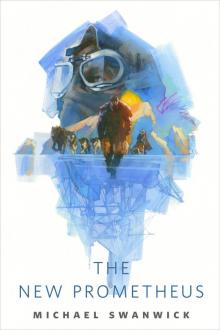 The New Prometheus
The New Prometheus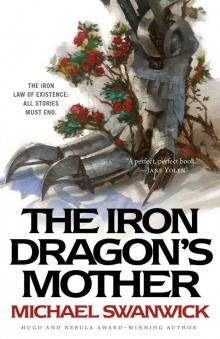 The Iron Dragon’s Mother
The Iron Dragon’s Mother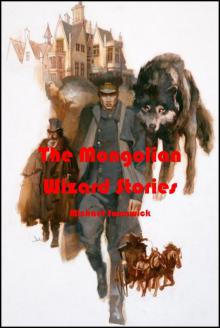 The Mongolian Wizard Stories
The Mongolian Wizard Stories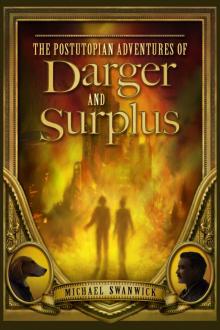 The Postutopian Adventures of Darger and Surplus
The Postutopian Adventures of Darger and Surplus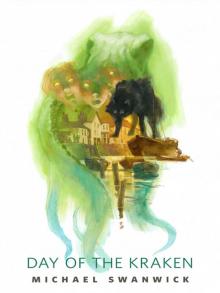 Day of the Kraken
Day of the Kraken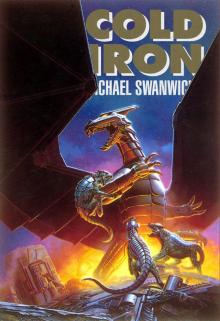 Cold Iron
Cold Iron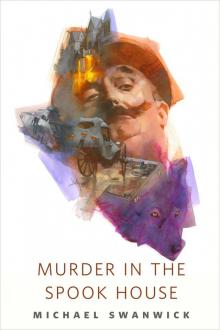 Murder in the Spook House: A Tor.com Original
Murder in the Spook House: A Tor.com Original Radio Waves
Radio Waves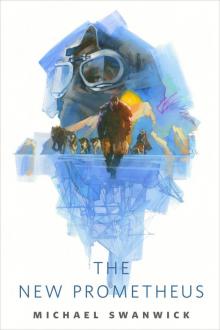 The New Prometheus: A Tor.com Original
The New Prometheus: A Tor.com Original Stations of the Tide
Stations of the Tide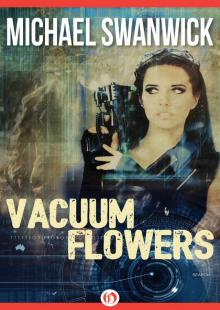 Vacuum Flowers
Vacuum Flowers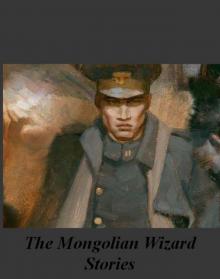 The Mongolian Wizard Stories (online stories 1-7)
The Mongolian Wizard Stories (online stories 1-7)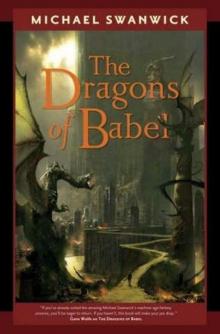 The Dragons of Babel
The Dragons of Babel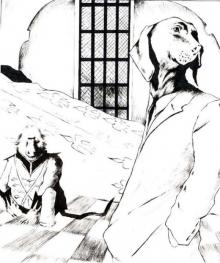 The Dog Said Bow-Wow
The Dog Said Bow-Wow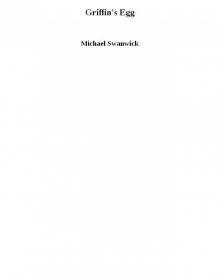 Griffin's Egg
Griffin's Egg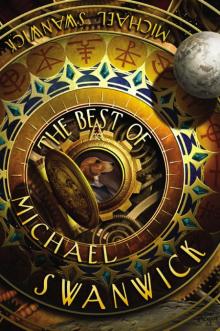 The Best of Michael Swanwick
The Best of Michael Swanwick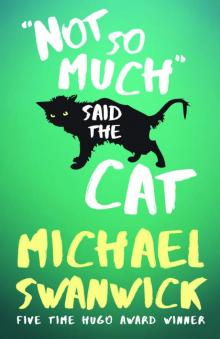 Not So Much, Said the Cat
Not So Much, Said the Cat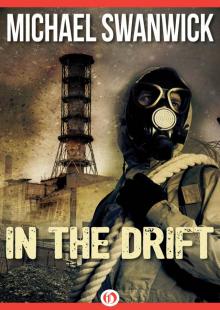 In the Drift
In the Drift Vacumn Flowers
Vacumn Flowers Slow Life
Slow Life The Wisdom Of Old Earth
The Wisdom Of Old Earth Legions In Time
Legions In Time Scherzo with Tyrannosaur
Scherzo with Tyrannosaur The Year's Best Science Fiction (2008 Edition)
The Year's Best Science Fiction (2008 Edition)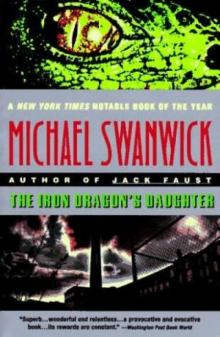 The Iron Dragon's Daughter
The Iron Dragon's Daughter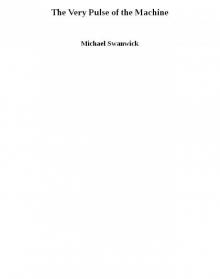 The Very Pulse of the Machine
The Very Pulse of the Machine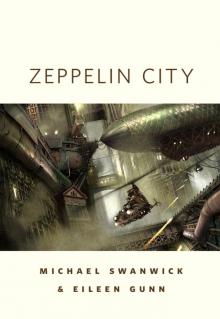 Zeppelin City
Zeppelin City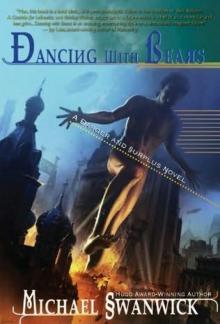 Dancing with Bears
Dancing with Bears Bones of the Earth
Bones of the Earth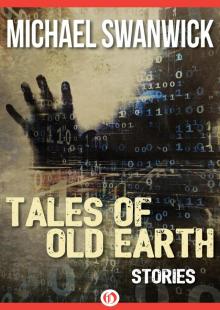 Tales of Old Earth
Tales of Old Earth Trojan Horse
Trojan Horse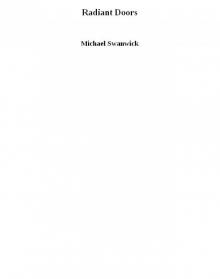 Radiant Doors
Radiant Doors